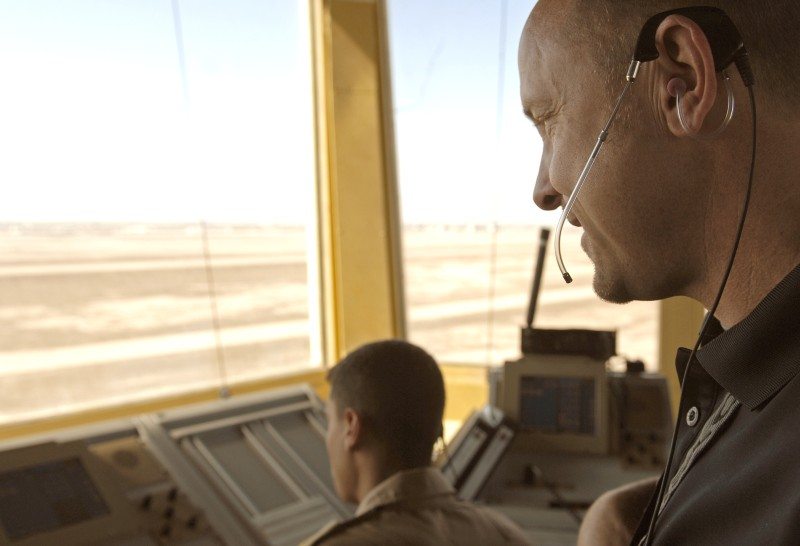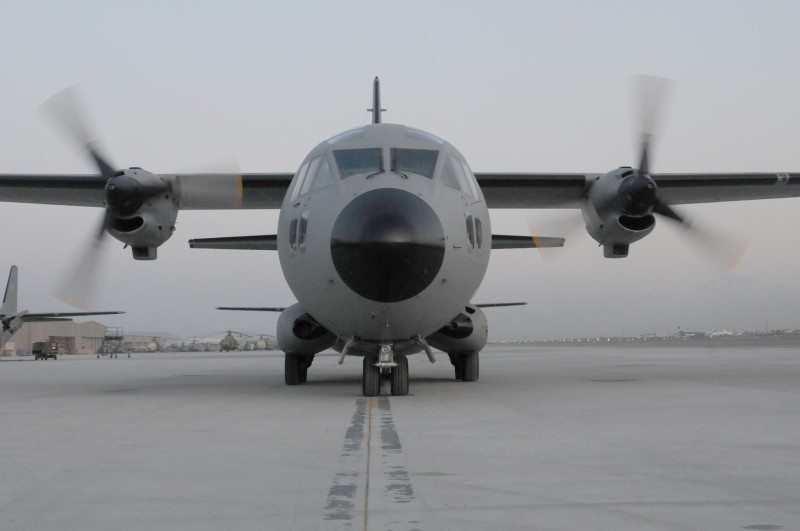As U.S. forces continue to draw down to meet the Dec. 31 deadline, Air Force air traffic control advisers have their eyes fixed on the sky above Iraq.
Maj. Rudolf Kuehne and Capt. Maureen Trujillo, senior ATC advisers for Iraq Training and Advisory Mission-Air, are tasked with ensuring their Iraqi air force partners are trained and equipped to gradually take over the ATC towers at bases throughout the country in the coming months.
“Our goal is to certify and license 24 controllers to conduct tower operations at five locations by the time we leave,” Captain Trujillo said.
The ATC training program, which first started in 2006, mirrors the U.S. Air Force ATC training program developed by Air Education and Training Command officials at Randolph Air Force Base, Texas. The Iraqi air force program currently has 55 officers in the training pipeline at Kirkuk, Ali and Taji airfields in Iraq. Of those officers, 15 have been certified and six have been licensed by the Iraqi Civil Aviation Authority — the equivalent to the Federal Aviation Administration in the U.S.
“The licensing of military controllers is the first ever in the country,” said Major Kuehne, who recently returned from a site visit to Kirkuk and Ali airfields Feb. 11. “Under Saddam (Hussein), civilian air traffic controllers were the only licensed controllers, but now we’re trying to get everyone on the same level so they all know and follow the same rules.”
On the front lines of the training effort are four veteran U.S. Air Force air traffic controllers who serve as training program managers, as well as advisers to local Iraqi air force leaders at the three airfields.
The senior ATC advisers also expanded the pool of contracted instructors who provided English tutoring as well as on-the-job training throughout the program.
“We more than doubled the number of contractors, from six to 15, since last October,” Major Kuehne said.
For trainees, the journey to become an air traffic control officer starts at the Defense Language Institutes at Taji or Tikrit, Iraq, where they study basic English for up to a year, depending on personal learning curves. The trainees advance to aviation English, which is the international aviation language, after scoring higher than a 60 on their basic English aptitude test.
After more than 150 hours of aviation English instruction, Iraqis move on to the nine-week long, 180-hour air traffic control fundamentals class, where they learn about principles of flight, airfield markings, basic meteorology and air traffic communication skills.
The Iraqi trainees then put their skills to the test with simulated airfield operations during a five-week-long, 120-hour aerodrome course. The students at Kirkuk took it upon themselves to build a model airfield to add a third dimension of realism while learning about departure clearances, aircraft separation distances and more in-depth air traffic control instructions during aerodrome training.
Trainees then take an English proficiency test before starting on-the-job training inside the tower. After another 90 hours or more of OJT, trainees take their certification exam and prepare to get their license through the ICAA.
The training process is by no means easy, officials said, especially considering language differences and cultural considerations, as well as personal security risks and the occasional mortar attack on an airfield.
“The trainee’s duty schedule and learning English are the most significant challenges we face,” said Tech. Sgt. David Lusher, an ATC adviser at Ali Air Base.
Sergeant Lusher explained that the Iraqi air force work schedule revolves around “mu-jas,” or paid leave, which typically ranges from one to two weeks depending on the local Iraqi air force commander’s policy. Sergeant Lusher and other advisers said the long break between technical training prolongs the learning curve for most students, and in limited cases, impacts their career progression.
“Just like in the ATC program in the United States, this job is not for everyone,” Major Kuehne said. “There are people out here who are motivated to do the job, and there are some who are not. The ones who make it through can be proud because they did a lot of work and they did it by themselves.”
Around bases like Kirkuk, ATC students are held in high regard by the Iraqi pilots who are learning to fly various fixed- and rotary-wing aircraft.
“With the success we’ve had here, Iraqi pilots like to hear our Iraqi students in the tower,” said Master Sgt. Jenny Tibi, who serves as the ATC adviser for more than a dozen students at Kirkuk.
Master Sgt. Jerry McBride Jr., an ATC adviser at one of the program’s busiest towers, Taji Airfield, said his students get plenty of training with a monthly average of 25,000 operations that includes arrivals, departures, over flights and training flights.
He said his Iraqi air force students also get a sample of joint operations working with U.S. Army Soldiers and Iraqi army aviation command officials.
At Ali Air Base, Airmen and contractors, along with Iraqi air traffic controllers, handle 2,500 operations, 400 cargo tons and 2,500 passengers per month on a single runway. Base officials also recently reopened the base’s second runway after a $5 million reconstruction project to fix cracks and spalls, or divots created from mortar and rocket attacks.
“The operations here run very smooth because of the teamwork between ITAM-Air (officials), contractors and the Iraqi air force trainees,” said Master Sgt. Bryan Herrington, Ali AB’s chief air traffic controller. “As a collective team, we all strive for the same goal of ensuring Iraqi sovereignty while providing quality air traffic control services to our customers.”











